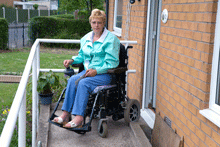
In order to live independently some people may require additional assistance in the form of adaptations to their home.
This could include:
- widening doorways or improving lighting to improve access to and within the property
- improving access to kitchen facilities, for example, fitting appropriate height cupboards and worktops if you use a wheelchair or improving lighting and providing high contrast work surfaces for people with visual impairments
- ramps and railings to improve access in and out of your home
- changing the layout of rooms to improve access to facilities such as a toilet
- providing a stair lift or through floor lift to provide access to the upstairs
- fitting a shower over your bath
- replacing your bath with a level access shower
- converting existing rooms to alternative uses, for example, to create a downstairs bedroom or bathroom
- building additional facilities such as a downstairs toilet or shower where it is not possible to provide this elsewhere
- improving access to your garden
If a property can't be adapted
In some cases, it's not possible to carry out adaptations to a particular property. This may be because of problems with the design, structure, location or landlord permission which make it impractical or the costs prohibitive.
For more information, please contact your district or borough council
Help towards the cost of the adaptation
There are various ways in which you can access help with the cost of the adaptations you need.
Privately owned or rented property
Each year, the government allocates an amount of money specifically to help with the funding of major adaptations to district and borough councils. This money is known as the Disabled Facilities Grant.
The Disabled Facilities Grant is a mandatory grant, which depending on your financial circumstances, can be used to fund all or part of major adaptations (those that cost over £1,000) to your home. An application for a Disabled Facilities Grant will need to be supported by an assessment and recommendation from an occupational therapist.
Council housing
District councils in Derbyshire who have retained their own council houses, or have them managed by an arms length management organisation, continue to fund adaptations from their budgets.
If you are a council tenant a means test may be undertaken to determine your contribution to the cost of the works. You may also be asked to consider if you are willing to move to an already adapted property if one is available. If this is the case you can be provided with moving costs under tenant incentive schemes. For further information please contact your local district or borough council.
District councils' apply funding criteria in line with those for a Disabled Facilities Grant (DFG). They will only consider undertaking the adaptation if it is supported by an assessment and recommendation from an occupational therapist.
Housing association property
Many housing associations will arrange for minor adaptations and certain major adaptation (such as stair lifts) to be completed from their own budgets. Help with the cost of other major adaptations may be possible in the form of a Disabled Facilities Grant. An assessment and recommendation from our occupational therapy service is required.